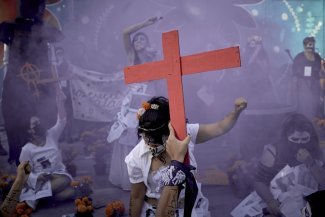Indigenous peoples from different parts of Paraguay living under the arches of Asuncion’s disused central railway station.
Discrimination against women, LGBTI people, indigenous peoples and other groups continues unabated in Paraguay, in the absence of a law penalising it, whilst in the rest of South America, with the exception of French Guiana, Suriname and Guyana, legislation has been passed against racism, segregation and homophobia.
Despite being totally surrounded by land, Paraguay’s cultural isolation means that it often resembles an island. It is a country that seems unaffected, at times, by the changes taking place around it. Over the last decade, all the Southern Cone states have been adopting progressive legislation in the fight against discrimination – but not Paraguay.
Politicians from the minority left and social organisations working to defend human rights have been fighting for almost twenty years to have a bill approved that criminalises all forms of discrimination. But neither the political elite, most of whom belong to the two main conservative parties – the Colorados and Liberals – nor the Catholic nor Evangelical churches, seem willing to allow it.
Real cases of discrimination
The indigenous leader of the Qom people, Bernarda Pessoa, almost gave birth to her first son on the floor of a hospital waiting room. She was 18 years old at the time and had been waiting to be attended to for over four hours. She was left sitting on the floor, without food or water, just the sheet and clothes she had brought for her baby, and was totally ignored by the doctors and nurses, who made no attempt to communicate with her.
Paraguay’s main African-Paraguayan dancer, Barbara Medina, suffered so much racism at her school in Asunción that she would get angry when her mother would say she was black like the rest her family. She spent her teenage years hiding away, humilated by the racist comments directed at her.
Paraguayan professional singer Jennifer Hicks was sexually harassed by several musicians from Asunción during recording sessions and concerts, but was never able to denounce it; and biochemistry student Jessica Arce was advised by her boss “to make herself prettier and to lose weight”, before dismissing her from the laboratory where she worked.
These are some of the testimonies documented by the “I Do Not Discriminate” campaign led by Amnesty International in Paraguay to promote the approval of a law against all forms of discrimination.
The Julio Fretes bill
The bill backed by civil society was named after Julio Fretes, in remembrance of the activist who passed away in 2009 and who played a leading role in the battle for the rights of people with disabilities in Paraguay.
The text establishes the same provisions as the laws already approved in countries like Chile, Bolivia or Argentina. It simply seeks to regulate the constitutional prohibition of discrimination, which is not backed by specific legislation to ensure its implementation and enforcement.
The Chilean law, for example, passed in 2012, penalises all discrimination by state actors or individuals that infringe or threaten the fundamental rights of citizens.
It establishes that a person cannot, for example, be arrested or dismissed from their work on the basis of “race or ethnic group, nationality, socio-economic situation, language, ideology or political opinion, religion or belief, unionisation or participation in trade union organisations or the lack thereof, gender, sexual orientation, gender identity, marital status, age, affiliation, personal appearance and illness or disability”.
Similar legislation also exists in Uruguay (2004), Peru (2006), Venezuela (2011), Colombia (2011) and Ecuador.
But Paraguay’s Catholic Church has managed to convince a large portion of the public that this type of legislation goes against their beliefs.
The Paraguayan Episcopal Conference (CEP) issued communiqués when the bill was being debated, appealing to the “human and Christian conscience” of the legislators and calling on them to use their vote “in defence of the family and marriage, contracted by a man and a woman”.
Nevertheless, Senator Carlos Filizzola, of the progressive, left-wing electoral alliance Frente Guasú (FG), defended the bill before the press at the doors of the Congress, the last time it was debated in 2015. “People are saying that it is about same-sex marriage or abortion, but not one article of this law speaks of these matters. It only speaks of non-discrimination. The proposed law establishes fines and imprisonment of up to two years for those who violate people’s dignity”.
“What this law does is to regulate Article 46 of the National Constitution, which prohibits all forms of discrimination. Paraguay has committed to nondiscrimination in international forums and the United Nations. The law sets out what constitutes discrimination,” argued the politician.
The executive does not seem prepared to back this legislation or, as if it were the Catholic Church itself, anything to do with the word “gender”.
And nor does President Horacio Cartes, a tobacco magnate who came to power in 2013 with the Colorado Party – the same political formation that ruled the country during the dictatorship (1954-1989) and has continued dominate power since the transition to democracy (1992-2008).
His opinions on marriage equality were even covered by The New York Times, after he likened gay people to “monkeys” and associated same-sex partners with “the end of the world”. In a radio interview in the middle of the election campaign he said that he would “shoot himself in the balls” if his son were homosexual.
2017. The year of change
Despite the blocking tactics deployed by the conservatives, the Network Against All Forms of Discrimination has managed to introduce the term “discrimination” into Paraguayan society, according to one of its members, a lawyer and feminist activist, Mirta Moragas.
“Since 2014, people have been using the word discrimination. The abuses we see denounced on a daily basis on social networks are described as discrimination. People no longer say, ‘I was snubbed’ or ‘ill-treated’; they say, ‘I was discriminated against’. For me, it is a symbolic cultural battle,” she tells Equal Times.
The Network, made up of 28 organisations and individuals, hopes the bill will be discussed in Congress again in 2017 and that it will finally be approved, since it has been backed by the Human Rights Committee and the Equality and Gender Committee in the Senate.
“Still not having a law against all forms of discrimination is disgraceful for a country in the 21st century. We have made progress in other areas but clearly not in this one,” said the Mayor of Asunción, Mario Ferreiro, in December, at a ceremony honouring his support for the cause, held by the Network Against All Forms of Discrimination at the headquarters of the feminist organisation Aireana.










